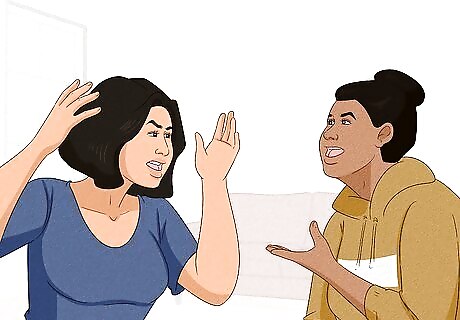
views
- It's common to date someone for 3 to 5 months before saying "I love you," but everyone develops an emotional bond at their own pace.
- Say "I love you" if you're both equally committed to the relationship and talk about the future together.
- Give it some more time if you never discuss the future with your significant other and don't have a lot of common goals and values.
Risks of Saying "I Love You" Too Soon

They might not say it back. It's possible that the two of you are simply moving at a different pace. Although they do like you and enjoy your company, they're just not at the point of saying those words yet. Unfortunately, this can lead to a bit of awkwardness and confusion. What to do if this happens: Don't retract what you said if you really feel it! This is about how you feel, not whether they feel the same way about you. Instead, ask them why they aren't ready to say it back yet. Listen actively and show your love through your care and concern. Try to remain calm in this situation—getting angry or upset won't help matters. If you need to, step away for a few minutes and take a few deep breaths before you talk to your significant other about what you said.

They might feel pressured to say it back even though they don't feel it. Reading your significant other's body language can tell you if they really mean what they say or not. Pay attention in particular to their immediate action when you say it—are they momentarily startled or confused? Then it's possible they weren't ready to take that step yet. If they say it before they're ready, they could potentially feel guilty about it. What to do if this happens: Tell them that you're just expressing your feelings and it's fine if they're not ready to go there yet. You might say, "I'm sorry if it's a bit early for you to say that. We can go at your pace—there's no rush."

You might scare them off. Your significant other might just be more cautious than you or they might be afraid of commitment. It's also possible that they're just looking for something casual and aren't interested in getting that serious. Regardless of the reason, saying "I love you" makes them want to put the brakes on your relationship. What to do if this happens: Be willing to take a step back and give them some time to think things through. You can talk in a couple of weeks and find out what you want to do next.

It might not be as special the next time you say it. The first time you say "I love you" in a relationship can seem like a pretty important milestone. If you say it too soon, you risk turning a milestone moment into something awkward and embarrassing to look back on. When you say it again (or when your significant other says it for the first time), it might not have that same feeling. What to do if this happens: Just acknowledge it and try to move on with the relationship. You'll have plenty of special moments together in the future—it's fine that you don't have a cute story about this one.
When to Say "I Love You"

Say "I love you" when it feels right—usually after 3+ months. In the first month or so of your relationship, what you're most likely feeling is infatuation, not love. Research shows it takes men about 3 months to say "I love you" for the first time and it takes women about 5 months. Those averages are a pretty good indication of how long you should wait before you say "I love you." At the same time, if you truly feel it, you should say it. Just make sure you're unattached to the outcome and it won't change things for you if they don't say it back. Different people also develop an emotional bond with someone faster than others, which makes it hard to determine exactly when it's right to say "I love you" and when you should give it a little more time.
Signs It's Too Soon to Say "I Love You"

You haven't started discussing the future together yet. If your significant other isn't including you in any of their plans, they might not be envisioning the two of you being together for the long haul. It might also just be that they're not ready to start thinking that way yet. Either way, it's probably best to hold off on confessing your feelings. If you want, you could mention something in the future yourself and see how they react. It could be that they are thinking of the two of you as an item, but nothing has really come up yet that they want to do with you in the future. For example, you might say, "Hey, I saw that The Midnight is going to have a show here in a couple of months. Aren't they one of your favorite bands? We should get tickets and go together."

You don't have similar values and goals. You might have a lot of differences, but sharing basic values is the foundation of a healthy relationship. If you don't have similar values and goals in life, it's probably not a good idea to tell your significant other you love them. If the two of you share ultimate goals and values, you'll find it much easier to compromise when you disagree on something. You're both headed in the same direction, you just have differing ways to get there.

You don't know each other very well. While "love at first sight" is definitely a feeling people experience, it's not really love. To develop real love takes intimacy and a commitment to the relationship. You can't truly love someone until you know them well, which will take you a little more time. This doesn't mean your feelings aren't real. But you should probably wait until you know your significant other a little bit better to see if your feelings persist or if they fizzle out.

You don't have deep, meaningful conversations. Depth is really important in a relationship. It's hard to know if what you feel is really love until you know your significant other on a deeper, more profound level. Love is a very profound feeling and should have some deep knowledge about your significant other attached to it. If you want to get to know your significant other better, try asking them open-ended questions to get their ideas and viewpoints about various profound topics. For example, you might ask, "What do you feel most grateful for in your life?" Asking them questions about their childhood and their life before you met is another way to get them to open up so you can get to know them better.

You don't know how they treat others. How they treat other people can tell you a lot about their character and how they'll eventually treat you. This is particularly true about people who've been in their life a long time, such as their family. If you've never seen how they act around their close friends and family, it's probably too early to tell them you love them. Because how they treat others reveals a lot about their character, you can't truly know if you love them or not until you've seen them around people they consider close. This doesn't mean that you can't fall in love with someone who had a troubling or difficult childhood and has a strained relationship with their family. Take all of the circumstances into account when you think about this.

You're not ready to be vulnerable. Vulnerability is the birthplace of intimacy, so if you're not ready to be vulnerable, that's a good sign that it's too soon to say "I love you." Just saying those words is going to put you in a vulnerable position, especially if you're not sure how they're going to respond. If you don't feel comfortable being vulnerable with your significant other or you're afraid that they're going to hurt you, it's probably better for you to hold off saying "I love you," at least for a month or two.

You're not looking for the same things in a relationship. If your significant other is looking for something more casual, saying "I love you" could scare them off. They'll think that you're looking for a much greater commitment than they're prepared to make. With time that might change, but for now, it's probably too early to express that depth of feeling. Talk with your significant other about what they're ultimately looking for before you dive in headfirst and say "I love you." This will help you better understand if the two of you are on the same page. For example, you might say, "I've been thinking a lot about the future and I think I'm ultimately looking to settle down with someone special. What are you looking for?"

You've already had serious arguments or disagreements. In a healthy, loving relationship, you can communicate well and be kind to each other even when you disagree. If you've been at each other's throats, you might want to hold off on using the "L" word. This doesn't mean that if you love someone you always have to agree with them—no two people are going to see eye to eye on everything. But when you do disagree, you know how to talk it through and you care enough about your significant other to want to understand their point of view.
Signs It's Time to Say "I Love You"

You've reached a certain level of understanding and commitment. If both of you are fully committed to the relationship and genuinely care about each other, it's a great time to take it to the next level and confess your feelings. When you know that your significant other truly cares about you, you can trust that they'll treat you with kindness even if they aren't ready to say the words yet. Often, once you get to this point, you can be fairly well assured that your significant other is going to say "I love you" back when you say it for the first time. If you have any doubts here, it's a good idea to talk to your significant other about it first. For example, you might say, "We've been seeing each other for two months. Where do you see this relationship going?"

You discuss the future together a lot. When you include each other in your future plans, you're signaling that you expect the two of you to be together. You're imagining what your life will be like together in the future, and that's a sign that your relationship is on solid ground. It's definitely a great time to tell your significant other you love them. The further out into the future you're talking, the better! It's great if your significant other is telling you about something they want to do with you a month from now, but even better if they're talking about something happening next year or over the course of the next few years.

You both use "we" when talking about yourselves as a couple. If you both talk about yourselves as a couple using "we," it shows that you're thinking about yourselves as interdependent, meaning that you affect each other's thoughts and feelings. Your thoughts have become relationship-oriented, and that makes this a great sign that it's time to finally confess your feelings. This also means that you know each other well enough to be able to intuit the things that the two of you will enjoy seeing and doing together.

You've met their friends and family. When you're in a healthy relationship with a strong bond, you both honor and respect each other's friends and family. The important people in your significant other's life are important to you too. You don't get jealous or upset when your significant other spends time with their friends or goes out on their own without you. If you have an independent life apart from your significant other while still spending plenty of quality time with them, that's a sign that you have a strong and healthy bond.

You've already shown vulnerability. Being vulnerable is the foundation for an intimate, loving relationship. It can be scary to be vulnerable with someone else, but if you've already shown vulnerability to your significant other and they've handled it well, you know you can trust them. That means it's probably a good time for you to tell them you love them. Saying "I love you" can be an incredibly vulnerable moment. But if you've already been vulnerable with your significant other, you know they'll treat you kindly, even if they're not ready to say it back yet.

You're both looking for a serious, committed relationship. It's a great sign if you know that you and your significant other are on the same page as far as the type of relationship you're looking for. That makes it a lot easier to say "I love you" because you know you're both committed to the relationship for the long term and aren't just having a fling. Once you've confessed your love for your significant other, you've potentially crossed the threshold into a more serious emotional bond. You're not just saying that you like them or enjoy hanging out with them, but that they're really important to you.

You've seen your significant other's flaws. You know that nobody's perfect, but if you've seen your significant other's flaws and still love them, it's time to tell them how you feel. This is a sure sign that you're looking at your relationship realistically rather than idealizing it. If you believe that your significant other has no flaws, on the other hand, you're still in the honeymoon phase of your relationship. You might love them, but right now you're probably still just infatuated.
What can you say if it's too soon?

Use a more indirect expression of your feelings to relieve the pressure. Romantic love grows at different paces for everyone. If you feel that your significant other isn't ready for "I love you" just yet, you can use other phrases that communicate how you feel about them without using those emotionally charged words. Here are some ideas: "You're so important to me." "You make me happy." "I appreciate you." "I love it when you...." Complete this with something they do that you love. "You mean a lot to me." "I love your...." Complete this with something about them that you love.




















Comments
0 comment